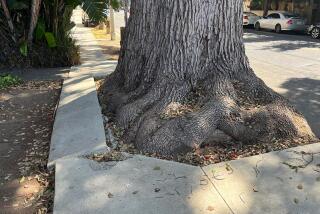Some Modest Proposals for L.A.âs Next Mayor
Can Los Angeles be made more livable? Can it meet air-quality standards? Create safer and cleaner workplaces? Eliminate myriad environmental hazards in its most economically stressed neighborhoods? Turn vacant lands in the inner city into community gathering places? Re-envision a true river running from one end of the L.A. Basin to the other?
The upcoming campaigns for mayor and the City Council will be a good starting point for the discussion.
Los Angeles is ready to be reinvented. Take the Los Angeles River. Sixty years ago, the Army Corps of Engineers, various county and city agencies and leading power brokers in the city declared âwar on the L.A. River.â They transformed it into a concrete-lined flood-control channel. Today, parts of the river have been designated a state park, and an impressive array of community groups and environmental organizations seek to identify new ways of re-greening the river and making it accessible. Some groups have boldly raised the issue of managing the river differently, even suggesting that the concrete can be replaced by birds, plants and other wildlife without diminishing flood protection.
The cityâs brownfields are another opportunity for reinvention. The city currently has no coherent policy on such sites. Mayor Richard Riordanâs office procures subsidies for large developers promising to generate jobs on them but saying little about what kinds of jobs they have in mind or what community needs can be met. Indeed, the affected community may not even be given a say in the matter. The Cornfield site, north of Chinatown and adjacent to the L.A. River, illustrates the point. There, a big developer wants to put up warehouses and light-manufacturing facilities, for which Riordan has helped secure millions of dollars in federal-government subsidies. Yet, a study commissioned by the Urban and Environmental Policy Institute also identifies the neglected community needs of housing, schools and open space as well as the critical importance of more transparent decision-making.
A new mayor can do much to transform our urban environment and make our neighborhoods more livable. Recognizing that possibility, a number of community and workplace activists, along with planners, policy analysts and academics, have been collaborating to create proposals to make Los Angeles more livable, more just and democratic. Through the newly formed Progressive Los Angeles Network, nearly a dozen task forces on such topics as housing, economic development, food and nutrition and the urban environment have been formed. They are devising an agenda for change in advance of the city elections in 2001. For the urban environment, here are a few of the strategies identified by the task forces:
* A livability plan for Los Angeles with targets for implementation (e.g., cleaner-air goals, more open or recreational space). Community participation in the development of such a plan is central.
* Greater access to information on environmental hazards and health issues through a right-to-know program.
* A brownfields policy based on the right of communities to review site assessments and participate in decisions regarding the designation of those sites. This policy should include goals for reducing toxic loads in communities; identifying appropriate or sustainable forms of community and economic development; and establishing opportunities for urban green space and recreational opportunities on vacant or contaminated lands.
* A pollution-prevention policy that identifies toxic hot spots and sets in motion strategies to manage them. Besides supporting research and development, this policy would push for the introduction of products and processes that reduce toxic use. Both workers and communities vulnerable to exposure need to be partners in helping establish programs.
* An alternative-fuels program for all city vehicles (both gasoline and diesel-powered vehicles). This program calls for replacing existing vehicles with those powered by alternative fuels, more fueling stations both for city vehicles and for the public and policies designed to encourage city contractors to use alternative-fuel vehicles.
The mayoral candidates will have an opportunity to respond to these and other proposals at a forum this month at Occidental College. The next mayor must be willing to involve the cityâs communities in making his vision a reality. The opportunities are there for the taking. *
More to Read
Sign up for Essential California
The most important California stories and recommendations in your inbox every morning.
You may occasionally receive promotional content from the Los Angeles Times.










